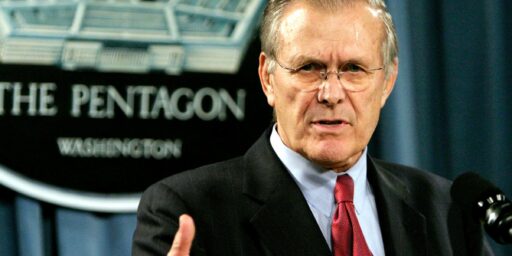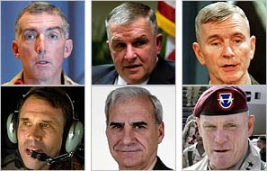Revolt of the Generals?
WaPo: Dissension Grows In Senior Ranks On War Strategy
Deep divisions are emerging at the top of the U.S. military over the course of the occupation of Iraq, with some senior officers beginning to say that the United States faces the prospect of casualties for years without achieving its goal of establishing a free and democratic Iraq.
Their major worry is that the United States is prevailing militarily but failing to win the support of the Iraqi people. That view is far from universal, but it is spreading and being voiced publicly for the first time.
Army Maj. Gen. Charles H. Swannack Jr., the commander of the 82nd Airborne Division, who spent much of the year in western Iraq, said he believes that at the tactical level at which fighting occurs, the U.S. military is still winning. But when asked whether he believes the United States is losing, he said, “I think strategically, we are.”
Army Col. Paul Hughes, who last year was the first director of strategic planning for the U.S. occupation authority in Baghdad, said he agrees with that view and noted that a pattern of winning battles while losing a war characterized the U.S. failure in Vietnam. “Unless we ensure that we have coherency in our policy, we will lose strategically,” he said in an interview Friday.
***
Inside and outside the armed forces, experts generally argue that the U.S. military should remain there but should change its approach. Some argue for more troops, others for less, but they generally agree on revising the stated U.S. goals to make them less ambitious. They are worried by evidence that the United States is losing ground with the Iraqi public.
Some officers say the place to begin restructuring U.S. policy is by ousting Defense Secretary Donald H. Rumsfeld, whom they see as responsible for a series of strategic and tactical blunders over the past year. Several of those interviewed said a profound anger is building within the Army at Rumsfeld and those around him.
This is interesting but hardly surprising. The intensity of the insurgency is certainly affecting the planning. I’m also not sure how one tells one is winning this type of war until it’s almost over; as long as the insurgents can set off truck bombs and mount ambushes, they have a chance.
Rumsfeld hasn’t been popular among the senior leadership because he’s not as deferential to them as most SECDEFs have been and because he’s trying to force radical–and in my view, necessary–changes in the bureacracy. He held the position when these guys were still in school and is sufficiently sure of himself that he doesn’t back down. The fact that things aren’t going very well combined with the fact that others wanted to do things differently–although, as the article makes clear, there was no consensus on the alternate approach–it’s easy to blame Rumseld for the setbacks.
I find it outrageous though, that these generals are violating the law by publically disparaging their superiors in the chain of command. Civilian control of the military is a hallmark of our professional ethic.
Like several other officers interviewed for this report, this general spoke only on the condition that his name not be used. One reason for this is that some of these officers deal frequently with the senior Pentagon civilian officials they are criticizing, and some remain dependent on top officials to approve their current efforts and future promotions. Also, some say they believe that Rumsfeld and other top civilians punish public dissent.
Because public dissent from the chain of command isn’t permissible for military officers. It’s prejudicial to good order and discipline and violates unity of command, one of the principles of war. If these generals feel so strongly about this issue and honestly think current policies are endagering the troops, they have a duty to handle it in an above-board manner rather than by this cowardly and illegal anonymous whining to the press. They can talk to Congress, which has oversight authority over the military, or they can retire and take their case to the public as civilians. Talking on background to the Post while sucking up to these same leaders in order to continue to advance their career is dishonorable.




These are also the same Generals who have been fighting with Rumsfeld over changing the structure of the Armed Services since he took office. Rumsfeld has publicly stated that he wishes to change the services to being smaller and faster, and the Generals hate the change to their bureaucracy. They may be saying this to get kill Rummy now when he is weakened.
I would hazard a guess that the same Generals whom the Post are going to for comments on Iraq are also the ones they went to regarding the changes to the Pentagon…
It is a good point that Rumsfeld’s other policies, aside from Iraq, have been a source of anger from the Military.
But it is also naive to think that this is not just the way things work. Check out the variety of stories of how the military went behind Clinton’s back and set him up for failure. The fact is that the Generals are an interest group and have to be kept happy. This applies to all Presidents, and Bush has been able to avoid it for a long time because of the quick punishment of previous critics and the historical bias of the military towards Republican Presidents.
It is difficult to balance the individual’s right of Free Speech and the needs of Command And Control. All subordinates find themselves in a conflict of interest when they disagree with those who they can not talk directly to in private but who control their future destinies.
There has always been a majority of Army officers who didn’t like Rumsfeld, didn’t want to change the structure of the Army, and preferred the Army was never used unless to protect North America. (See my previous comments about an unwillingness to see the Army ‘broken’.)
Until 9/11, the anger at Rumsfeld was so severe that there was significant talk among his enemies that they wanted him to resign. But after 9/11, those voices were silenced temporarily, but their opinions about ‘transformation’ have not changed. This opinion can be most clearly heard among the retired officers who are interviewed on TV.
Officers who were promoted under the principles of the old system are biased by their life experience to oppose fundamental change in that system. Army officers hating Rumsfeld isn’t new. They have always hated him, and still hate him. Rumsfeld has always been the most hated Sec. Def. by the military bureaucracy.
The voices quoted in Ricks’ Washington Post article are basically reactionary. Basically, they are a bunch of blowhards who don’t want their lives and careers disrupted. I don’t take them seriously. They were saying the same thing back in the summer of 2001. When these people begin to be willing to resign their comfortable jobs, and speak out publicly against the President’s policies, then I will begin to take them seriously, not until then.
Bush and especially Cheney, Rumsfeld and Wolfowitz are completely committed to modernizing the US military. Even if Kerry is elected, many of those changes will still go forward.
More importantly, any policy based on the supposition that Iraqis and Arabs are unsuited to democracy is fundamentally racist. In many ways it is the kind know-nothing political opinion the media elites might expect from career military officers.
Choosing a friendly dictatorship over an unfriendly democracy is exactly the kind of political victory our enemies in the Middle East are hoping for. It is fundamentally a betrayal of our ideals, and will be used to discredit American foreign policy for generations to come.
In any case, it is too late now to make any other policy choice. Once the choice to invade Iraq was made, our policy course was set in stone. As I have said before, from that moment we were commiting ourselves to a 10+ year occupation of Iraq. We have incurred debts and responisbilties and we must pay them. To allow innocent Iraqis to die so that we will not have to make sacrifices will be seen by the world as what it is – pure cowardice. To hesitate now would be exceptionally childish.
Iraq must become a peaceful, free and independent country. Even if that means that the government is anti-American like most of the other Arabs countries (with the exception of small countries such as Jordan, Qatar, Bahrain, Dubai, Morocco and Tunisia). The US no longer has the freedom to choose fascism over liberty.
Leaving behind an anti-American democracy in Iraq would be a clear victory for the US.
Peace and Freedom for an Independent Iraq!
I am so sick of the WaPo’s Unnamed Sources. Seriously. Does anyone actually use their name in a quote in washington D.C.?
I take this story with a LARGE box of Kosher Salt.
Every week we hear about who hates rummy or Bush and how there is growing discontent in the ranks. Then when it comes time to reenlist, people do in record numbers. (or whatever empirical models can be used that disproves the story of the week before.)
Maybe these Generals did this and if they did, as James says, they are wrong for it.
But the media has been announcing that the sky is falling on troop moral for over a year. We ain’t seen it yet.
I’m not all that concerned about what the Generals think of Rumsfeld except insofar as the degree to which they dislike him suggests that he’s doing his job well.
No, my thought when reading this was, “I’m glad I’m not in the 82nd Airborne being led by a General who thinks we’re losing.”
I hope we win the hearts and minds of the Iraqis, but frankly, that is not my top priority….fighting terrorism is and if Iraq serves as the magnet to attract the full attention….and we beat them tactically every time, then we win.
So if we don’t win their hearts and minds, that’s too bad, we just occupy them instead and stop spending money on the infrastructure and social programs and use those fund to blow up and break things like we normally do during the time of WAR.
—